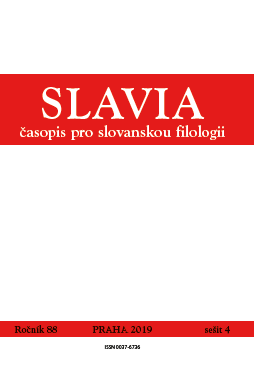Autotematyzm w powieści polskiej XX wieku
Autothematism in the Polish Novel of the 20th Century
Author(s): Bogusław BakułaSubject(s): Polish Literature
Published by: AV ČR - Akademie věd České republiky - Slovanský ústav and Euroslavica
Keywords: novel; Künstlerroman; metafiction; mise en abyme; essay in novel; autothematism; autobiography; fiction in novel; Polish literature
Summary/Abstract: The article offers a synthetic approach to the phenomenon of self-reflection in the Polish novel of the 20th century. The Polish literary critic A. Sandauer called the process of writing a novel within the novel with the author’s self-reflection by the term of autotematyzm (autothematism). The term has analogies in Western Literary Studies as mise en abyme, self-reflective novel, self-reference novel, metafiction. The origin of the Polish autothematic novel is derived from the tradition of a romantic digressive poem and a novel about an artist at the beginning of the 20th century: The Hag (1903) by K. Irzykowski, Rotten Wood (1903) by W. Berent. After 1918, due to the introduction of the essay, journalistic methods, autobiography, as well as disillusion of narration to the novel, autothematic prose became an important field of the literary experiment (F. Goetel, S. I. Witkiewicz, W. Gombrowicz). After 1956, in the writings of W. Mach (Mountains over the Black Sea, 1961), T. Parnicki (Identity, 1972) and J. Andrzejewski (The Pulp, 1979), the autothematic novel varied formally and crossed the boundaries of the discussion on literariness. It turned into the area of ethical, historical and political discussions, linking historical experience, dramatic historical events that shaped the existence of Polish society in the 20th century. The ethical aspect of self-reflection combined with writer’s autobiography became a distinctive feature of prose that appeared in the Polish samizdat in the 70s–80s. (The Pulp). A separate position is given to historical novels by T. Parnicki, which became the site of the author’s concept of autothematism as the theory of the novel (Identity). Postmodernism following 1989 eliminates the political, ethical and theoretical aspects of autothematism, making it an intertextual convention partly belonging to popular literature.
Journal: Slavia - časopis pro slovanskou filologii
- Issue Year: LXXXVIII/2019
- Issue No: 4
- Page Range: 425-431
- Page Count: 7
- Language: Polish

